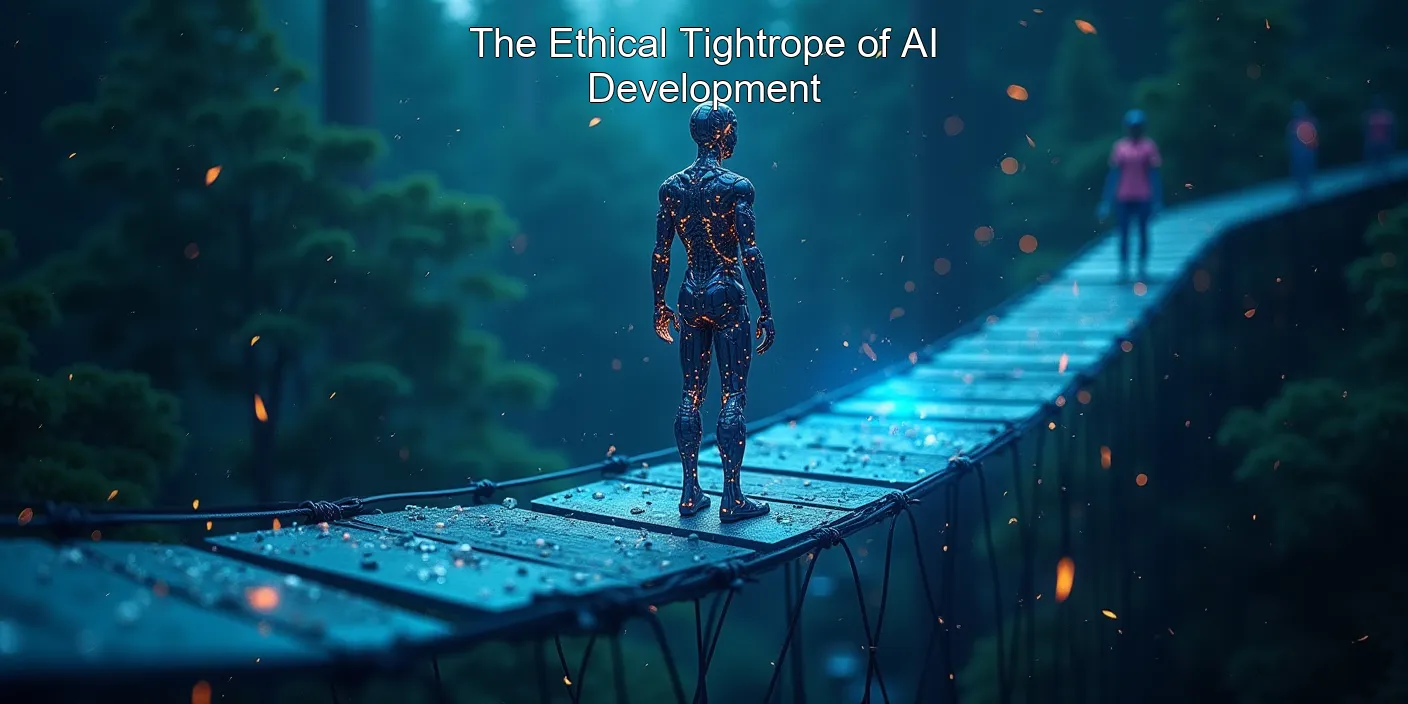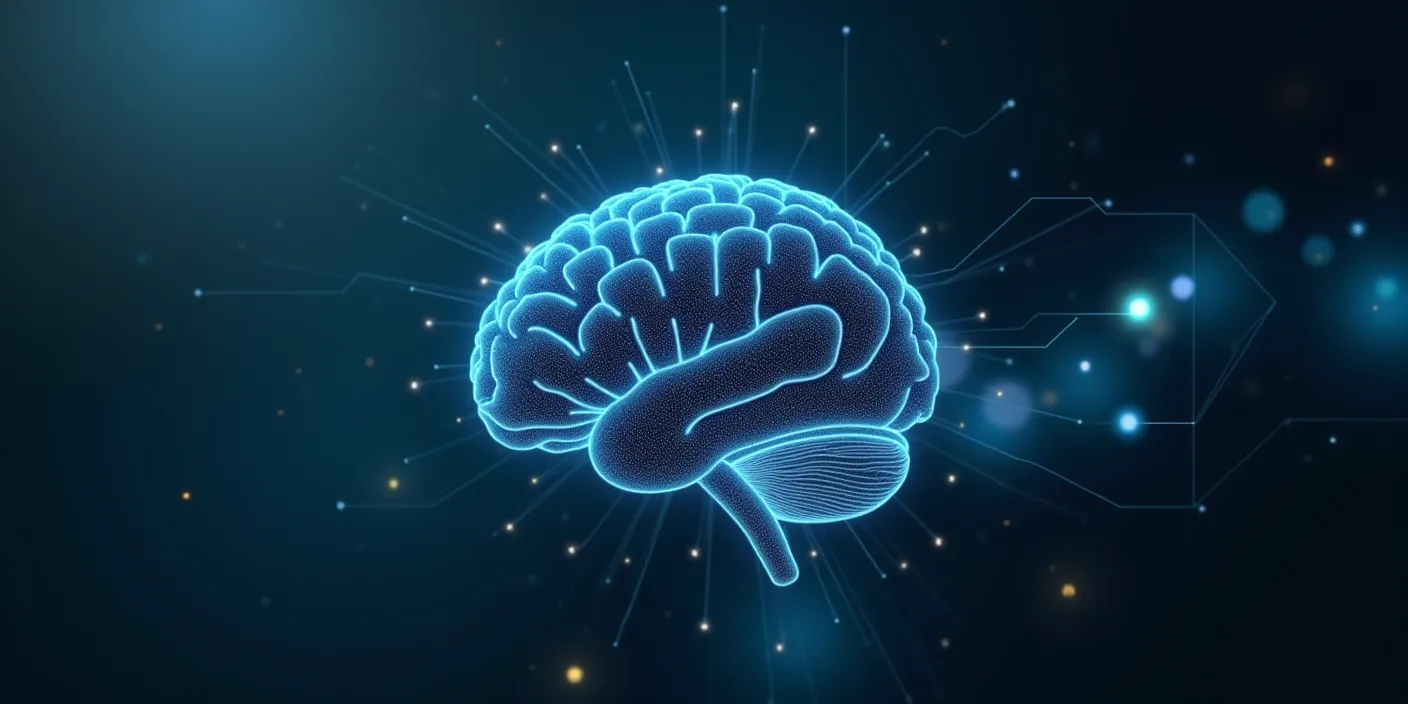Navigating the Ethical Maze: Key Dilemmas in AI Development and Deployment
As artificial intelligence continues to reshape our world, we find ourselves at a critical juncture where the ethical implications of AI development and deployment demand our attention. In this article, we’ll explore the major ethical dilemmas faced by AI creators, users, and society at large, offering insights to help navigate this complex landscape.

#EthicalDilemmas, #AIDevelopment, #TechEthics
The Ethical Tightrope of AI Development

| Ethical Concern | Key Challenges |
|---|---|
| Bias and Fairness | Ensuring AI systems are free from discriminatory biases |
| Privacy | Protecting personal data while leveraging it for AI training |
| Transparency | Making AI decision-making processes understandable to humans |
The development of AI systems presents a myriad of ethical challenges. Consider the following key areas:
“AI Challenges: Bias, Privacy, Jobs, Accountability, Transparency”
- Bias mitigation in AI algorithms
- Ensuring data privacy and security
- Maintaining transparency in AI decision-making processes
- Addressing the potential for job displacement
“The greatest danger of artificial intelligence is that people conclude too early that they understand it.” – Eliezer Yudkowsky, AI researcher
This quote underscores the importance of continuous learning and vigilance in AI ethics. As we delve deeper into AI capabilities, new ethical concerns emerge, requiring ongoing attention and adaptation.
Frequently Asked Questions on AI Ethics
- Q: How can we ensure AI systems are unbiased?
A: Regular audits, diverse development teams, and careful data selection are crucial steps in minimizing AI bias. - Q: What role does transparency play in AI ethics?
A: Transparency is vital for building trust and allowing for accountability in AI systems. - Q: How can we balance innovation with ethical considerations?
A: Implementing ethical guidelines early in the development process and fostering a culture of responsible innovation are key.
Practical Steps for Ethical AI Development
- Establish clear ethical guidelines for AI projects
- Conduct regular ethical audits of AI systems
- Invest in diverse and inclusive AI development teams
- Prioritize explainable AI techniques
- Engage in ongoing dialogue with ethicists and stakeholders
According to a recent study by the AI Ethics Lab, 78% of AI professionals believe that ethical considerations should be a mandatory part of AI education and training programs.
“AI Pros Advocate for Mandatory Ethics in Education: 78% in Favor”
The Deployment Dilemma: Balancing Progress and Precaution
| Deployment Concern | Potential Impact |
|---|---|
| Autonomous Systems | Safety and accountability issues |
| AI in Healthcare | Patient privacy and treatment decisions |
| AI in Finance | Fairness in lending and investment decisions |
The deployment of AI systems across various sectors raises unique ethical challenges:
- Ensuring safety and accountability in autonomous vehicles
- Protecting patient privacy in AI-driven healthcare solutions
- Maintaining fairness in AI-powered financial decisions
- Addressing the societal impact of AI in law enforcement
“With great power comes great responsibility, and the power of AI demands a new level of ethical responsibility from its creators and users.” – Dr. Fei-Fei Li, AI researcher and educator
This sentiment captures the essence of the ethical imperative in AI deployment, emphasizing the need for responsible innovation and thoughtful implementation.
Frequently Asked Questions on AI Deployment Ethics
- Q: How can we ensure AI systems respect privacy rights?
A: Implementing robust data protection measures and adhering to privacy-by-design principles are essential. - Q: What are the ethical considerations in AI-driven healthcare?
A: Patient autonomy, data privacy, and the potential for bias in treatment recommendations are key concerns. - Q: How do we address the potential for job displacement due to AI?
A: Focusing on reskilling programs and creating new job opportunities in AI-related fields can help mitigate this issue.
Best Practices for Ethical AI Deployment
- Conduct thorough impact assessments before deployment
- Implement robust monitoring and feedback mechanisms
- Ensure human oversight in critical AI-driven decisions
- Develop clear protocols for AI system failures or errors
- Foster public dialogue and education on AI capabilities and limitations
A survey by the World Economic Forum found that 85% of business leaders believe AI will significantly transform their industry within the next five years, highlighting the urgency of addressing these ethical concerns.
As we continue to push the boundaries of AI Innovations, it’s crucial to remember that ethical considerations are not obstacles to progress, but rather guideposts for responsible advancement. By addressing these dilemmas head-on, we can harness the full potential of AI while safeguarding our values and societal well-being.
The integration of AI into AI in Everyday Life presents both exciting opportunities and significant challenges. As we navigate this new terrain, it’s essential to consider the broader implications of AI, including its impact on AI in Entertainment and other sectors.
Ultimately, the pursuit of Ethical AI is not just a technical challenge, but a societal imperative. By fostering a culture of responsible innovation and ongoing ethical reflection, we can ensure that AI serves as a force for good, enhancing human capabilities while respecting our fundamental values and rights.
Ethical Dilemmas in AI Development and Deployment: Navigating the Moral Maze
As artificial intelligence continues to advance at a breakneck pace, we find ourselves grappling with complex ethical dilemmas that challenge our moral compass. From privacy concerns to job displacement, the development and deployment of AI technologies raise critical questions about the future of humanity. Let’s dive into the murky waters of AI ethics and explore the major challenges we face.
The Ethical Tightrope: Balancing Progress and Responsibility

| Key Ethical Concerns | Potential Impacts |
|---|---|
| Privacy | Data breaches, surveillance |
| Bias | Discrimination, unfair decisions |
| Accountability | Unclear responsibility for AI actions |
| Job displacement | Unemployment, economic inequality |
As we navigate the ethical tightrope of AI development, we must consider:
- The potential for AI to infringe on personal privacy
- The risk of perpetuating and amplifying existing biases
- The challenge of assigning responsibility for AI decisions
- The socioeconomic impact of widespread AI adoption
“With great power comes great responsibility. As we develop increasingly powerful AI systems, we must ensure that we’re also developing the ethical frameworks to guide their use.” – Dr. Fei-Fei Li, AI researcher and professor at Stanford University
Frequently Asked Questions
Q: How can we ensure AI systems are unbiased?
A: Developing diverse and representative training data, implementing rigorous testing protocols, and fostering inclusive AI development teams are crucial steps in mitigating bias in AI systems.
Q: Who is responsible when an AI system makes a mistake?
A: This is a complex issue that often depends on the specific context. Generally, responsibility may be shared among developers, deployers, and users of AI systems, highlighting the need for clear accountability frameworks.
Q: How can we balance innovation with ethical considerations?
A: Implementing ethical guidelines, fostering interdisciplinary collaboration, and prioritizing transparency in AI development can help strike a balance between innovation and responsible AI deployment.
- Establish clear ethical guidelines and principles
- Implement rigorous testing for bias and fairness
- Prioritize transparency and explainability in AI systems
- Foster diverse and inclusive AI development teams
- Engage in ongoing ethical training and education
According to a recent survey by the World Economic Forum, 84% of global business leaders believe that greater regulation is needed to ensure responsible AI development and deployment. This statistic underscores the growing recognition of the ethical challenges posed by AI technologies.
As we continue to push the boundaries of AI capabilities, it’s crucial that we remain vigilant about the ethical implications of our innovations. By fostering open dialogue, implementing robust ethical frameworks, and prioritizing responsible development practices, we can harness the transformative power of AI while safeguarding our values and protecting human rights.
For a deeper dive into the ethical considerations surrounding AI, explore our comprehensive guide on Ethical AI. To understand how AI is reshaping various aspects of our lives, check out our articles on AI in Everyday Life. For cutting-edge developments in the field, don’t miss our coverage of AI Innovations. And to see how AI is transforming the entertainment industry, visit our section on AI in Entertainment.
As we navigate the ethical maze of AI development and deployment, let’s commit to creating a future where technology enhances human potential while respecting our fundamental rights and values. The choices we make today will shape the AI-driven world of tomorrow – let’s ensure it’s a world we’re proud to inhabit.
Understanding the Ethical Landscape of AI
| Key Aspects | Ethical Considerations |
|---|---|
| Data Privacy | Consent, transparency, security |
| Bias and Fairness | Algorithmic bias, discrimination |
| Accountability | Responsibility for AI decisions |
As we delve into the world of artificial intelligence, we’re confronted with a myriad of ethical challenges. Let’s explore the key areas where ethics intersect with AI development:
- Data collection and usage practices
- Algorithmic decision-making processes
- Transparency in AI systems
- Impact on employment and society
“The development of full artificial intelligence could spell the end of the human race.” – Stephen Hawking
This stark warning from Hawking underscores the gravity of ethical considerations in AI. A study by the Pew Research Center found that 66% of Americans are concerned about AI’s impact on personal privacy.
FAQ: Ethical AI Development
Q: What is algorithmic bias?
A: Algorithmic bias occurs when AI systems make unfair or discriminatory decisions due to flaws in their training data or design.
Q: How can we ensure AI accountability?
A: Implementing transparent AI systems, establishing clear lines of responsibility, and creating regulatory frameworks are key steps.
Q: What role does data privacy play in ethical AI?
A: Data privacy is crucial in ensuring that personal information is collected, used, and stored responsibly, respecting individual rights and consent.
Balancing Innovation and Ethics in AI
| Innovation Aspect | Ethical Consideration |
|---|---|
| Rapid AI Advancement | Potential societal impacts |
| AI in Decision-Making | Human oversight and control |
| AI in Sensitive Areas | Privacy and security concerns |
Navigating the delicate balance between pushing the boundaries of AI Innovations and maintaining ethical standards is a complex challenge. Consider these steps:
- Establish ethical guidelines early in the development process
- Conduct regular ethical audits of AI systems
- Involve diverse perspectives in AI development teams
- Prioritize transparency and explainability in AI algorithms
“Ethics cannot be an afterthought in AI development. It must be woven into the fabric of innovation from the start.” – Fei-Fei Li, AI researcher
A survey by Deloitte found that 32% of companies are using AI to enhance products, and 22% are creating new AI-based products. This rapid adoption underscores the urgency of ethical considerations.
FAQ: Ethical AI Deployment
Q: How can businesses ensure ethical AI deployment?
A: By implementing robust testing, continuous monitoring, and establishing an ethical review board for AI projects.
Q: What are the risks of ignoring ethics in AI?
A: Risks include legal liabilities, reputational damage, and potential harm to individuals or society at large.
Q: How does Ethical AI impact user trust?
A: Ethical AI practices build user trust by demonstrating responsibility, transparency, and respect for individual rights.
The Future of Ethical AI: Challenges and Opportunities

| Challenge | Opportunity |
|---|---|
| Evolving Technology | Continuous Ethical Framework Updates |
| Global AI Governance | International Collaboration |
| AI in Sensitive Domains | Specialized Ethical Guidelines |
As AI continues to permeate various aspects of our lives, from AI in Entertainment to AI in Everyday Life, the ethical landscape becomes increasingly complex. Here are key considerations for the future:
“AI’s Rising Role: Navigating Ethics in Everyday Life”
- Developing adaptive ethical frameworks that evolve with AI technology
- Fostering global cooperation on AI ethics and governance
- Educating the public about AI ethics and their implications
- Encouraging interdisciplinary approaches to ethical AI development
“The question of whether a computer can think is no more interesting than the question of whether a submarine can swim.” – Edsger W. Dijkstra
This quote reminds us that as AI capabilities grow, our ethical frameworks must adapt to new realities. A report by the World Economic Forum predicts that by 2025, 85 million jobs may be displaced by AI, while 97 million new roles may emerge.

As we navigate these ethical dilemmas, it’s crucial to remain vigilant, adaptive, and committed to developing AI that serves humanity’s best interests. The future of ethical AI lies in our hands, and it’s our responsibility to shape it wisely.



